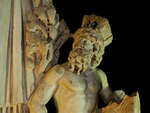
Pontus
Pontus was one of the Greek primordial deities that ruled on the earth before the arrival of the Olympians. His name meaning sea, he was a sea god, son of Gaea alone. He and Gaea had five children, Nereus, "the old man of the sea"; Thaumas, "the wonder of the sea"; Phorcys; Ceto; and Eurybia.
See Also: Gaea
Pontus Q&A
Pontus Associations
Link/Cite Pontus Page
You can freely use the content on this page for non-commercial reasons (homework, lessons, school essays or
college projects, free online courses) as long as you
cite this page as the source.
Written by: The Editors of GreekMythology.com. GreekMythology.com editors write, review and revise subject areas in which they have extensive knowledge based on their working experience or advanced studies.
For MLA style citation use: GreekMythology.com, The Editors of Website. "Pontus". GreekMythology.com Website, 24 Jan. 2015, https://www.greekmythology.com/Other_Gods/Pontus/pontus.html. Accessed 26 April 2024.

